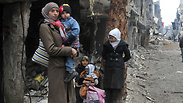
Besieged residents of Yarmouk near Damascus
צילום: EPA
Russia key to UN action on Syria humanitarian aid
To please Moscow, proposed Security Council resolution stripped of aggressive language about expectations and enforcement, yet Moscow is still not keen to support the measure.
The fate of a Western and Arab-backed UN resolution demanding immediate access everywhere in Syria to deliver desperately needed humanitarian aid rests with Russia.
Diplomats said Friday it was unclear whether Russia will veto the resolution, support it or abstain. Whatever it decides, close ally China will almost certainly follow suit.
The supporters scheduled a Security Council vote Saturday morning, giving Russia's UN Ambassador Vitaly Churkin the extra time he requested to get instructions from Moscow.
US Ambassador Samantha Power expressed strong support for the resolution on Friday and urged the council to "speak with one voice to help ensure that the children, women and men affected by the Syrian crisis receive the essential life-saving assistance they are being denied."
Russia and China, which support the Syrian government, have vetoed three previous resolutions backed by Western nations that would have pressured Syrian President Bashar Assad to end the three-year conflict.
'Safe humanitarian access'
The Security Council did come together in October to approve a weaker presidential statement on the worsening humanitarian crisis in Syria. It urged the Syrian government to facilitate "safe and unhindered humanitarian access to people in need through the most effective ways, including across conflict lines and, where appropriate, across borders from neighboring countries."But UN humanitarian chief Valerie Amos said last week that the presidential statement has not delivered the results that are critically needed, calling progress on the humanitarian front in the last four months "limited, uneven and painfully slow." She backed a legally binding council resolution if it has "levers" that lead to change on the ground.
The initial draft resolution, sponsored by Australia, Luxembourg and Jordan, threatened sanctions if all demands weren't implemented within 15 days. Churkin said this was a "non-starter" and circulated a rival draft that didn't mention sanctions and focused strongly on the need to fight terrorism in Syria.
Council members then spent two weeks in intense negotiations in hopes of getting Russia on board, which would send a strong signal to Damascus to let humanitarian aid into the country quickly.
The final text being put to a vote on Saturday has tougher language on terrorism but makes no mention of sanctions. Instead, it asks Secretary-General Ban Ki-moon to report to the Security Council on the implementation of the resolution every 30 days and expresses the council's intent "to take further steps in the case of non-compliance with this resolution."
Weakend draft
Even this weak language could prove too much for the Russians. Diplomats, speaking on condition of anonymity because negotiations have been private, said Russia also didn't support other key provisions which remain in the final draft.It demands "that all parties, in particular the Syrian authorities, promptly allow rapid, safe and unhindered humanitarian access for UN humanitarian agencies and their implementing partners, across conflict lines and across borders, in order to ensure that humanitarian assistance reaches people in need through the most direct routes."
The final draft calls on all parties "to immediately lift the sieges of populated areas," which are named.
It also demands that all parties allow the delivery of humanitarian aid, "cease depriving civilians of food and medicine indispensable to their survival, and enable the rapid, safe and unhindered evacuation of all civilians who wish to leave." And it demands a halt to all attacks against civilians and indiscriminate shelling and aerial bombardment, including the use of barrel bombs, in populated areas.
Russia's Churkin said Moscow would support a text promoting pragmatic measures. Russian Foreign Minister Sergey Lavrov stressed that the Syrian government must give its consent to cross-border aid deliveries, which could be used to supply weapons to the opposition.
China's Foreign Ministry spokesperson Hua Chunying said Thursday "the action by the Security Council should contribute to the political settlement of the Syrian issue and further talks between the two warring parties." She expressed hope that consultations would "keep the council united and speak with one voice to the outside."
Whether that happens remains to be seen.










